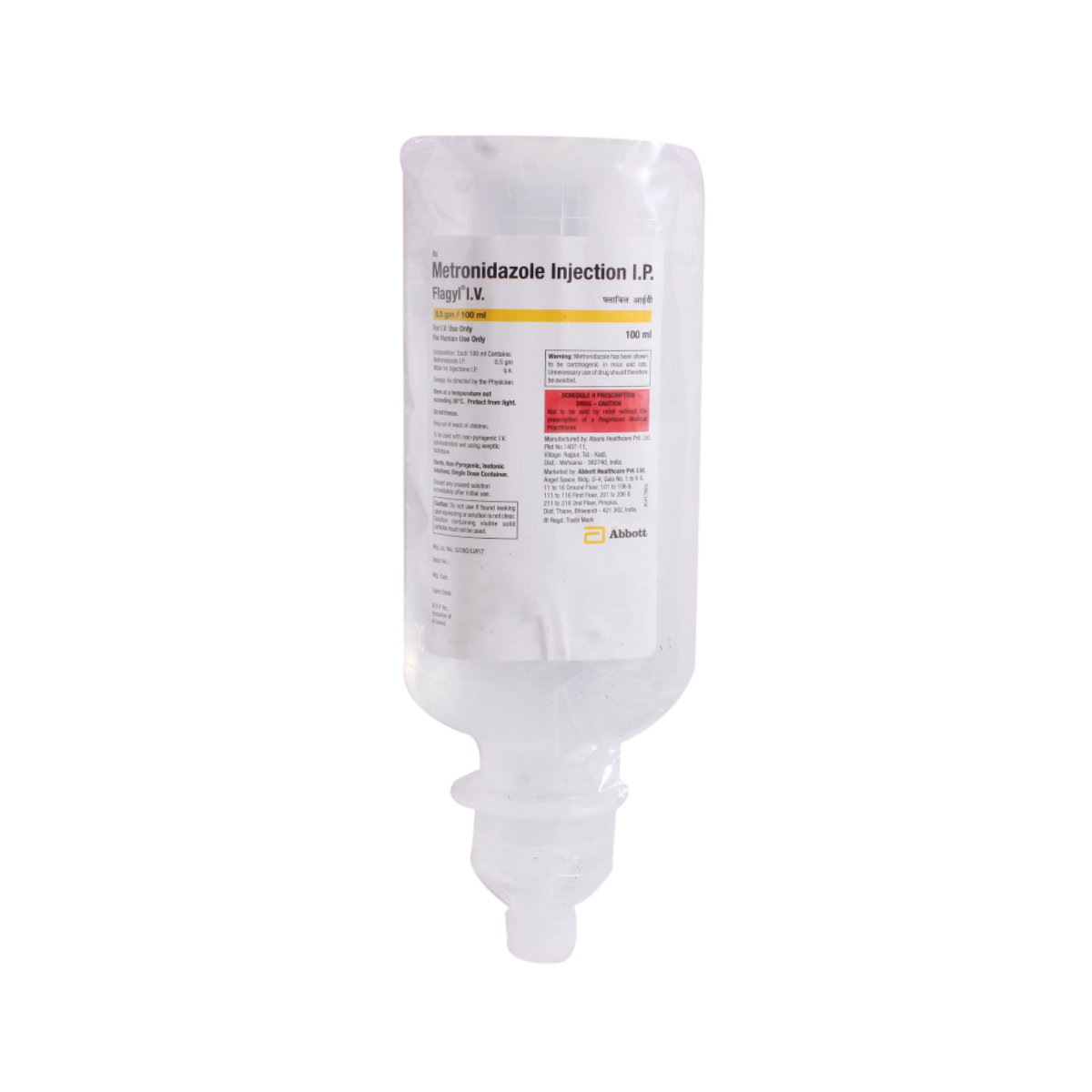Flagyl IV 500 mg Injection 100 ml
MRP ₹22
(Inclusive of all Taxes)
₹3.3 Cashback (15%)
Provide Delivery Location
Online payment accepted
 Prescription drug
Prescription drugWhats That
Composition :
Manufacturer/Marketer :
Consume Type :
Expires on or after :
Return Policy :
NPPA :
About Flagyl IV 500 mg Injection
Flagyl IV 500 mg Injection belongs to a group of medicines known as anti-bacterial agents used to treat severe bacterial infections of the bone, skin and skin structure, blood, joint, abdomen, central nervous system, respiratory, gynaecological infections, meningitis (infection of the membranes that surround the brain and spinal cord), and endocarditis (infection of the heart lining and valves).
Flagyl IV 500 mg Injection contains Metronidazole, which suppresses protein synthesis by interacting with DNA and causes helical DNA structure loss and strand breakage. As a result, it induces cell death in susceptible organisms. Thereby Flagyl IV 500 mg Injection treats bacterial infections.
Flagyl IV 500 mg Injection will be administered by a healthcare professional; do not self-administer. Some common side effects of Flagyl IV 500 mg Injection are nausea, vomiting, diarrhoea, constipation, and injection site reaction. These side effects are temporary and may get resolved after some time. However, if any of the side effects persist or worsen, contact the doctor.
Let your doctor know if you are allergic to metronidazole. Consult your doctor if you are pregnant, planning to get pregnant, or if you are breastfeeding. Do not operate heavy machinery or drive after taking Flagyl IV 500 mg Injection as it may cause dizziness and drowsiness. Avoid consumption of alcohol while on treatment with Flagyl IV 500 mg Injection as it may cause unpleasant side effects.
Uses of Flagyl IV 500 mg Injection
Directions for Use
Key Benefits
Flagyl IV 500 mg Injection belongs to a group of medicines known as anti-bacterial agents used to treat severe bacterial infections of the bone, skin and skin structure, blood, joint, abdomen, central nervous system, gynecologic, respiratory infections, meningitis (infection of the membranes that surround the brain and spinal cord), and endocarditis (infection of the heart lining and valves). Flagyl IV 500 mg Injection contains Metronidazole, which suppresses protein synthesis by interacting with DNA and causes helical DNA structure loss and strand breakage. As a result, it induces cell death in susceptible organisms. Thereby Flagyl IV 500 mg Injection treats bacterial infections.
Storage
- Hydrate your body: Drink enough water to prevent dehydration and headaches.
- Calm Your Mind: Deep breathing and meditation can help you relax and relieve stress.
- Rest and Recharge: Sleep for 7-8 hours to reduce headache triggers.
- Take rest: lie down in a quiet, dark environment.
- Cold or warm compresses can help reduce tension.
- Stay Upright: Maintain good posture to keep symptoms from getting worse.
- To treat headaches naturally, try acupuncture or massage therapy.
- Over-the-counter pain relievers include acetaminophen and ibuprofen.
- Prescription Assistance: Speak with your doctor about more substantial drug alternatives.
- Severe Headaches: Seek emergency medical assistance for sudden, severe headaches.
- Frequent Headaches: If you get reoccurring headaches, consult your doctor.
- Headaches with Symptoms: Seek medical attention if your headaches include fever, disorientation, or weakness.
- Inform your doctor about dizziness symptoms. They may adjust your medication regimen or prescribe additional medications to manage symptoms.
- Follow your doctor's instructions for taking medication, and take it at the same time every day to minimize dizziness.
- When standing up, do so slowly and carefully to avoid sudden dizziness.
- Avoid making sudden movements, such as turning or bending quickly, which can exacerbate dizziness.
- Drink plenty of water throughout the day to stay hydrated and help alleviate dizziness symptoms.
- If you're feeling dizzy, sit or lie down and rest until the dizziness passes.
- Track when dizziness occurs and any factors that may trigger it, and share this information with your doctor to help manage symptoms.
Drug Warnings
Do not take Flagyl IV 500 mg Injection if you are allergic to any of the components. Consult your doctor if you are pregnant, plan to get pregnant or if you are breastfeeding. Do not operate heavy machinery or drive after taking Flagyl IV 500 mg Injection as it may cause dizziness and drowsiness. Inform your doctor if you have bone marrow depression/low blood count, kidney impairment, CNS disorder, liver or heart problems, peripheral neuropathy, epilepsy, Crohn's disease (a condition in which the body attacks the lining of the digestive tract), yeast infection, oedema (swelling), or blood disorders.
Drug-Drug Interactions
Drug-Drug Interactions
Login/Sign Up
Co-administration of Amprenavir with Flagyl IV 500 mg Injection 100 ml can increase the risk or severity of side effects.
How to manage the interaction:
Taking Flagyl IV 500 mg Injection 100 ml with Amprenavir is generally avoided as it can result in an interaction, it can be taken if your doctor has advised it. However, if you experience throbbing in the head and neck, throbbing headache, difficulty breathing, nausea, vomiting, sweating, thirst, chest pain, rapid heartbeat, palpitation, low blood pressure, dizziness, lightheadedness, blurred vision, and confusion, contact a doctor immediately. Do not discontinue any medications without consulting a doctor.
Drinking alcohol while taking Flagyl IV 500 mg Injection 100 ml can increase the risk or severity of side effects.
How to manage the interaction:
Taking Flagyl IV 500 mg Injection 100 ml with Ethanol is avoided as it can result in an interaction, it can be taken if your doctor has advised it. However, if you experience flushing, throbbing in head and neck, throbbing headache, difficulty breathing, nausea, vomiting, sweating, thirst, chest pain, rapid heartbeat, palpitation, low blood pressure, dizziness, lightheadedness, blurred vision, and confusion, contact a doctor immediately. Do not discontinue any medications without consulting a doctor.
Coadministration of Disulfiram with Flagyl IV 500 mg Injection 100 ml can increase the risk of side effects.
How to manage the interaction:
Taking Flagyl IV 500 mg Injection 100 ml and Disulfiram together is generally avoided as it can lead to an interaction, it can be taken if advised by your doctor. However, if you experience sudden dizziness, confusion, weakness, shortness of breath, or palpitations, contact your doctor. Do not discontinue any medications without consulting a doctor.
Coadministration of Flagyl IV 500 mg Injection 100 ml with warfarin can increase the risk of bleeding.
How to manage the interaction:
There is a possible interaction between Flagyl IV 500 mg Injection 100 ml and warfarin, but they can be taken together if a doctor has prescribed them. Consult a doctor if experience unusual bleeding or bruising, vomiting, blood in your urine or stools, headache, dizziness, or weakness. Do not stop using any medications without talking to a doctor.
Coadministration of Busulfan and Flagyl IV 500 mg Injection 100 ml may increase the risk of side effects.
How to manage the interaction:
Taking Flagyl IV 500 mg Injection 100 ml and Busulfan together can result in an interaction, it can be taken if your doctor has advised it. However, if you experience unusual bruising or bleeding, fever, diarrhea, sore throat, muscle aches, shortness of breath, or burning during urination, contact a doctor immediately. Do not discontinue the medication without a doctor's advice.
Coadministration of Flagyl IV 500 mg Injection 100 ml with mebendazole may increase the risk or severity of side effects.
How to manage the interaction:
Although there is a possible interaction between Flagyl IV 500 mg Injection 100 ml and mebendazole, they can be taken together if your doctor has prescribed them. However, if you experience any unusual symptoms like fever, body ache, painful red rash, cough, peeling of the skin, or Drooling, contact a doctor immediately. Do not stop using any medications without talking to a doctor.
Co-administration of Fluconazole together with Flagyl IV 500 mg Injection 100 ml can increase the risk of an irregular heart rhythm.
How to manage the interaction:
-Taking Flagyl IV 500 mg Injection 100 ml with Fluconazole together can possibly result in an interaction, but it can be taken if a doctor has advised it. However, consult a doctor immediately if you experience any symptoms such as dizziness, lightheadedness, fainting, shortness of breath, or heart palpitations. Do not discontinue any medications without consulting a doctor.
Drug-Food Interactions
Drug-Food Interactions
Login/Sign Up
Diet & Lifestyle Advise
- It would be best to take probiotics after taking the full course of Flagyl IV 500 mg Injection to restore healthy bacteria in the intestine that may have been killed. Taking probiotics after antibiotic treatment can reduce the risk of antibiotic-associated diarrhoea. Certain fermented foods like yoghurt, cheese, sauerkraut and kimchi can help restore the intestine's good bacteria.
- Include more fibre-enriched food in your diet, as it can be easily digested by gut bacteria which helps stimulate their growth. Whole grains like whole-grain bread, and brown rice, should be included in the diet.
- Avoid intake of alcoholic beverages with Flagyl IV 500 mg Injection as it can make you dehydrated and affect your sleep. This can make it harder for your body to aid Flagyl IV 500 mg Injection in fighting off infections.
Side Effects of Flagyl IV 500 mg Injection
- Nausea
- Vomiting
- Diarrhoea
- Constipation
- Injection site reactions
Habit Forming
Therapeutic Class
All Substitutes & Brand Comparisons
RX
Out of StockMetronidazole Injection 100ml
B Braun Melsungen AG
₹12
(₹0.11/ 1ml)
45% CHEAPERRX
Out of StockMetris Injection 100 ml
Claris Lifesciences Ltd
₹13.6
(₹0.12/ 1ml)
40% CHEAPERRX
Fresogyl Injection 100 ml
Fresenius Kabi India Pvt Ltd
₹22
(₹0.2/ 1ml)
Author Details
We provide you with authentic, trustworthy and relevant information
Drug-Diseases Interactions
Drug-Diseases Interactions
Login/Sign Up
FAQs
Drug-Drug Interactions Checker List
- AMPRENAVIR
- ANISINDIONE
- DICUMAROL
- WARFARIN
- BCG VACCINE
- CHOLERA VACCINE LIVE
- TYPHOID VACCINE LIVE
- BUSULFAN
- DISULFIRAM
Disease/Condition Glossary
Bacterial infection: A bacterial infection is a condition in which harmful bacteria enter, multiply, and infect the body. It can target any body part and multiply very quickly. Generalized symptoms include fever, chills, and fatigue. Bacteria are of various forms comprising spherical, rod, and spiral-shaped. Bacterial infections vary from minor illnesses like sore throat and ear infections to severe brain infections like meningitis and encephalitis. Anyone can become infected with a bacterial infection. But, people with a weak immune system or taking immunosuppressive medicines are more prone to bacterial infection.

Have a query?
Alcohol
Safe if prescribed
You are recommended not to consume alcohol along with Flagyl IV 500 mg Injection to avoid unpleasant side effects such as stomach pain, nausea, vomiting, flushing, and headache.
Pregnancy
Consult your doctor
Please consult your doctor. Flagyl IV 500 mg Injection should be used in pregnant women only if clinically needed, and the benefits outweigh the risks.
Breast Feeding
Consult your doctor
Consult your doctor if you are a nursing mother. Your doctor will weigh the benefits and potential risks before prescribing Flagyl IV 500 mg Injection .
Driving
Safe if prescribed
Flagyl IV 500 mg Injection may cause dizziness and drowsiness; thus, avoid operating machinery or driving vehicles unless you are alert.
Liver
Consult your doctor
Flagyl IV 500 mg Injection to be taken with caution, especially if you have a history of liver diseases/conditions. Your doctor may adjust your dose depending upon your liver condition.
Kidney
Consult your doctor
Flagyl IV 500 mg Injection to be taken with extreme caution, especially if you have a history of kidney diseases/conditions. Your doctor may adjust your dose depending upon your kidney condition.
Children
Safe if prescribed
Limited information about the use of Flagyl IV 500 mg Injection in paediatric patients. Please seek medical advice. Your doctor will weigh the benefits and risks before prescribing this medicine to your child.










_0.jpg?tr=q-85)
